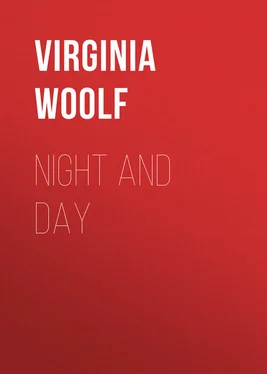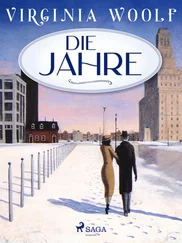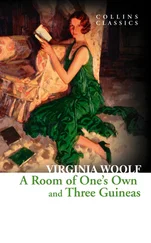Virginia Woolf - Night and Day
Здесь есть возможность читать онлайн «Virginia Woolf - Night and Day» — ознакомительный отрывок электронной книги совершенно бесплатно, а после прочтения отрывка купить полную версию. В некоторых случаях можно слушать аудио, скачать через торрент в формате fb2 и присутствует краткое содержание. Жанр: literature_20, foreign_prose, Зарубежные любовные романы, на английском языке. Описание произведения, (предисловие) а так же отзывы посетителей доступны на портале библиотеки ЛибКат.
- Название:Night and Day
- Автор:
- Жанр:
- Год:неизвестен
- ISBN:нет данных
- Рейтинг книги:3 / 5. Голосов: 1
-
Избранное:Добавить в избранное
- Отзывы:
-
Ваша оценка:
- 60
- 1
- 2
- 3
- 4
- 5
Night and Day: краткое содержание, описание и аннотация
Предлагаем к чтению аннотацию, описание, краткое содержание или предисловие (зависит от того, что написал сам автор книги «Night and Day»). Если вы не нашли необходимую информацию о книге — напишите в комментариях, мы постараемся отыскать её.
Night and Day — читать онлайн ознакомительный отрывок
Ниже представлен текст книги, разбитый по страницам. Система сохранения места последней прочитанной страницы, позволяет с удобством читать онлайн бесплатно книгу «Night and Day», без необходимости каждый раз заново искать на чём Вы остановились. Поставьте закладку, и сможете в любой момент перейти на страницу, на которой закончили чтение.
Интервал:
Закладка:
“And that’s Queenie Colquhoun,” she went on, turning the pages, “who took her coffin out with her to Jamaica, packed with lovely shawls and bonnets, because you couldn’t get coffins in Jamaica, and she had a horror of dying there (as she did), and being devoured by the white ants. And there’s Sabine, the loveliest of them all; ah! it was like a star rising when she came into the room. And that’s Miriam, in her coachman’s cloak, with all the little capes on, and she wore great top-boots underneath. You young people may say you’re unconventional, but you’re nothing compared with her.”
Turning the page, she came upon the picture of a very masculine, handsome lady, whose head the photographer had adorned with an imperial crown.
“Ah, you wretch!” Mrs. Hilbery exclaimed, “what a wicked old despot you were, in your day! How we all bowed down before you! ‘Maggie,’ she used to say, ‘if it hadn’t been for me, where would you be now?’ And it was true; she brought them together, you know. She said to my father, ‘Marry her,’ and he did; and she said to poor little Clara, ‘Fall down and worship him,’ and she did; but she got up again, of course. What else could one expect? She was a mere child – eighteen – and half dead with fright, too. But that old tyrant never repented. She used to say that she had given them three perfect months, and no one had a right to more; and I sometimes think, Katharine, that’s true, you know. It’s more than most of us have, only we have to pretend, which was a thing neither of them could ever do. I fancy,” Mrs. Hilbery mused, “that there was a kind of sincerity in those days between men and women which, with all your outspokenness, you haven’t got.”
Katharine again tried to interrupt. But Mrs. Hilbery had been gathering impetus from her recollections, and was now in high spirits.
“They must have been good friends at heart,” she resumed, “because she used to sing his songs. Ah, how did it go?” and Mrs. Hilbery, who had a very sweet voice, trolled out a famous lyric of her father’s which had been set to an absurdly and charmingly sentimental air by some early Victorian composer.
“It’s the vitality of them!” she concluded, striking her fist against the table. “That’s what we haven’t got! We’re virtuous, we’re earnest, we go to meetings, we pay the poor their wages, but we don’t live as they lived. As often as not, my father wasn’t in bed three nights out of the seven, but always fresh as paint in the morning. I hear him now, come singing up the stairs to the nursery, and tossing the loaf for breakfast on his sword-stick, and then off we went for a day’s pleasuring – Richmond, Hampton Court, the Surrey Hills. Why shouldn’t we go, Katharine? It’s going to be a fine day.”
At this moment, just as Mrs. Hilbery was examining the weather from the window, there was a knock at the door. A slight, elderly lady came in, and was saluted by Katharine, with very evident dismay, as “Aunt Celia!” She was dismayed because she guessed why Aunt Celia had come. It was certainly in order to discuss the case of Cyril and the woman who was not his wife, and owing to her procrastination Mrs. Hilbery was quite unprepared. Who could be more unprepared? Here she was, suggesting that all three of them should go on a jaunt to Blackfriars to inspect the site of Shakespeare’s theater, for the weather was hardly settled enough for the country.
To this proposal Mrs. Milvain listened with a patient smile, which indicated that for many years she had accepted such eccentricities in her sister-in-law with bland philosophy. Katharine took up her position at some distance, standing with her foot on the fender, as though by so doing she could get a better view of the matter. But, in spite of her aunt’s presence, how unreal the whole question of Cyril and his morality appeared! The difficulty, it now seemed, was not to break the news gently to Mrs. Hilbery, but to make her understand it. How was one to lasso her mind, and tether it to this minute, unimportant spot? A matter-of-fact statement seemed best.
“I think Aunt Celia has come to talk about Cyril, mother,” she said rather brutally. “Aunt Celia has discovered that Cyril is married. He has a wife and children.”
“No, he is NOT married,” Mrs. Milvain interposed, in low tones, addressing herself to Mrs. Hilbery. “He has two children, and another on the way.”
Mrs. Hilbery looked from one to the other in bewilderment.
“We thought it better to wait until it was proved before we told you,” Katharine added.
“But I met Cyril only a fortnight ago at the National Gallery!” Mrs. Hilbery exclaimed. “I don’t believe a word of it,” and she tossed her head with a smile on her lips at Mrs. Milvain, as though she could quite understand her mistake, which was a very natural mistake, in the case of a childless woman, whose husband was something very dull in the Board of Trade.
“I didn’t WISH to believe it, Maggie,” said Mrs. Milvain. “For a long time I COULDN’T believe it. But now I’ve seen, and I HAVE to believe it.”
“Katharine,” Mrs. Hilbery demanded, “does your father know of this?”
Katharine nodded.
“Cyril married!” Mrs. Hilbery repeated. “And never telling us a word, though we’ve had him in our house since he was a child – noble William’s son! I can’t believe my ears!”
Feeling that the burden of proof was laid upon her, Mrs. Milvain now proceeded with her story. She was elderly and fragile, but her childlessness seemed always to impose these painful duties on her, and to revere the family, and to keep it in repair, had now become the chief object of her life. She told her story in a low, spasmodic, and somewhat broken voice.
“I have suspected for some time that he was not happy. There were new lines on his face. So I went to his rooms, when I knew he was engaged at the poor men’s college. He lectures there – Roman law, you know, or it may be Greek. The landlady said Mr. Alardyce only slept there about once a fortnight now. He looked so ill, she said. She had seen him with a young person. I suspected something directly. I went to his room, and there was an envelope on the mantelpiece, and a letter with an address in Seton Street, off the Kennington Road.”
Mrs. Hilbery fidgeted rather restlessly, and hummed fragments of her tune, as if to interrupt.
“I went to Seton Street,” Aunt Celia continued firmly. “A very low place – lodging-houses, you know, with canaries in the window. Number seven just like all the others. I rang, I knocked; no one came. I went down the area. I am certain I saw some one inside – children – a cradle. But no reply – no reply.” She sighed, and looked straight in front of her with a glazed expression in her half-veiled blue eyes.
“I stood in the street,” she resumed, “in case I could catch a sight of one of them. It seemed a very long time. There were rough men singing in the public-house round the corner. At last the door opened, and some one – it must have been the woman herself – came right past me. There was only the pillar-box between us.”
“And what did she look like?” Mrs. Hilbery demanded.
“One could see how the poor boy had been deluded,” was all that Mrs. Milvain vouchsafed by way of description.
“Poor thing!” Mrs. Hilbery exclaimed.
“Poor Cyril!” Mrs. Milvain said, laying a slight emphasis upon Cyril.
“But they’ve got nothing to live upon,” Mrs. Hilbery continued. “If he’d come to us like a man,” she went on, “and said, ‘I’ve been a fool,’ one would have pitied him; one would have tried to help him. There’s nothing so disgraceful after all – But he’s been going about all these years, pretending, letting one take it for granted, that he was single. And the poor deserted little wife – ”
Читать дальшеИнтервал:
Закладка:
Похожие книги на «Night and Day»
Представляем Вашему вниманию похожие книги на «Night and Day» списком для выбора. Мы отобрали схожую по названию и смыслу литературу в надежде предоставить читателям больше вариантов отыскать новые, интересные, ещё непрочитанные произведения.
Обсуждение, отзывы о книге «Night and Day» и просто собственные мнения читателей. Оставьте ваши комментарии, напишите, что Вы думаете о произведении, его смысле или главных героях. Укажите что конкретно понравилось, а что нет, и почему Вы так считаете.












